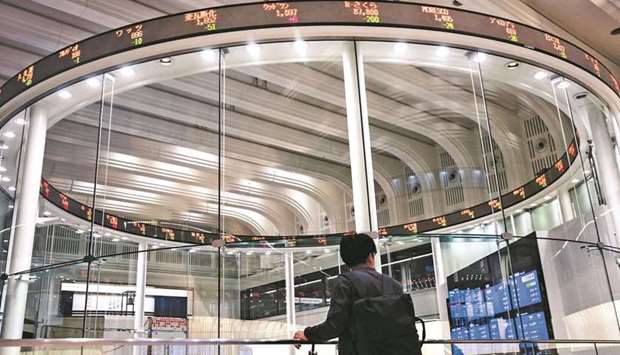Bargain-buying helped most Asian markets recover some of this week’s steep losses, with investors tracking a rally on Wall Street and taking heart from a forecast-beating jobless claims report, though inflation fears continue to cast a dark cloud over trading floors.
Global equities have been convulsed for months by expectations that a blockbuster global recovery will send prices rocketing, forcing central banks — particularly the Federal Reserve — to taper the ultra-loose monetary policies that have helped drive a rally for more than a year.
Despite pledges from top central bank officials that the spikes are temporary owing to last year’s low base and that they will not move until unemployment is under control and inflation is running consistently hot, investors have been preparing for what they see as the inevitable.
That has seen them sell firms at risk from higher interest rates, such as in the tech sector, and buy those that benefit, like financials. The scorching inflation narrative was reinforced this week with US consumer prices coming in far above estimates on Wednesday, followed by data on Thursday showing the wholesale price index at its highest since comparable records began in 2010.
“This bigger-than-expected rise does suggest that we will probably get another two or three months of high inflation prints,” said CMC Markets analyst Michael Hewson.
He added that would also present the Fed with “a problem, with so many people starting to get nervous that base effects may not be able to explain all of the upward pressure on prices”. Eyes are now on the release of retail sales later in the day.
Still, after days of selling, investors were ready to jump back into the fold, analysts said, helped by the release of a report showing new jobless claims in the world’s top economy came in below expectations and fell to their lowest level since the pandemic began.
The Dow and S&P 500 both rose more than 1%, while the tech-rich Nasdaq also enjoyed healthy gains.
The yield on benchmark 10-year Treasuries — a key gauge of future inflation — also eased. Asia broadly followed suit.
Tokyo piled on more than 2% and the heavily tech-weighted Taipei index climbed 1% after suffering massive losses this week.
Shanghai jumped 1.8%, Hong Kong put on 1.1%, Seoul added slightly less while Manila also edged up with Sydney.
However, Singapore slid nearly 3% as a spike in infections in the city puts an already once-delayed travel bubble with Hong Kong in doubt.
Wellington, Mumbai and Bangkok were also slightly down.
London, Paris and Frankfurt were all up in early trade.
Observers said they remain upbeat. “We see 10-year yields move up, we see inflation expectations move up, but as long as the underlying economic backdrop is still doing just fine it should power that value trade generally,” Lori Calvasina, of RBC Capital Markets, said on Bloomberg TV.
“We’re going to have some interesting days but the runway is there from an economic perspective for this rotation to keep going.” Markets were also given a psychological boost after the US Centers for Disease Control and Prevention said people would not be required to wear a mask if they had been fully vaccinated, a key step on the slow road to recovery.
Crude prices bounced after Thursday’s losses of more than 3% as supply concerns eased after the Colonial Pipeline, the biggest in the United States, resumed deliveries following a shutdown in response to a cyber attack last Friday.
The fall was also fuelled by concerns about the possibility of central banks tightening monetary policy.
However, Vandana Hari, of Vanda Insights, said the commodity was “poised for a bounce as it looks oversold after Thursday’s plunge”.
“India’s persistent Covid crisis, and continuing flare-ups in other parts of Asia, are already baked in,” she added.
In Tokyo, the Nikkei 225 closed up 2.3% to 28,084.47 points; Hong Kong — Hang Seng Index ended up 1.1% to 28,027.57 points and Shanghai — Composite closed up 1.8% to 3,490.38 points yesterday.

An electronic ticker displays share prices at the Tokyo Stock Exchange. The Nikkei 225 closed up 2.3% to 28,084.47 points yesterday.
